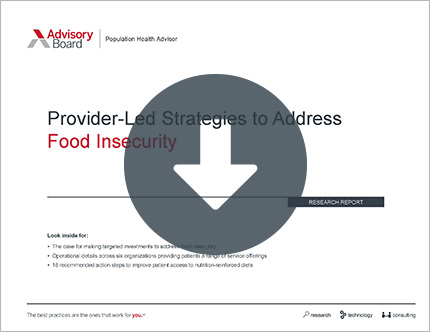Auto logout in seconds.
Continue LogoutNew research sheds light on what drives an otherwise pleasant person to become angry with hunger—a phenomenon commonly called "hangry," Angus Chen reports for NPR's "Shots."
Get 16 action steps for improving patient access to nutrition-reinforced diets
Research details
Jennifer MacCormack, a doctoral candidate in psychology and neuroscience at the University of North Carolina, Chapel Hill, recently conducted two experiments to better understand how hunger grows into "hangriness," Chen reports. The findings were published in the journal Emotion.
For one experiment, MacCormack sought to determine if self-awareness can stop the onset of hangriness. The experiment involved two groups: one consisting of 118 undergraduate students who had fasted for at least five hours and another consisting of 118 undergraduate students who had not fasted. In each group, half of the students were instructed to write an essay about their emotions and the other half were asked to write an essay about a neutral topic. Every student was then asked to complete a frustrating computer task during which the program would crash and an instructor would walk into the room asking what the student did to cause the error. Those students then completed a questionnaire about their emotions.
While all the students said they were somewhat upset about the experiment, the study found the hungry students who had not written about their emotions beforehand were particularly angry, Chen reports. "They thought the experimenter was more judgmental," said MacCormack. "They said they felt significantly more hate than other people."
For her second experiment, MacCormack had participants look at three types of pictures: positive, negative, or neutral. Neither hungry people nor not hungry people felt strongly either way when they looked at the positive or neutral pictures, MacCormack found. However, hungry people reacted more strongly to a negative picture than non-hungry people did.
Discussion
According to Elizabeth Davis—a psychologist at the University of California, Riverside, who was not involved in the experiments—the research has two main takeaways: One is that hunger itself doesn't induce hangriness; people need a negative stimulation or subject to feel hangry, while the other is that people who are more aware of their emotions are less likely to become hangry. Hunger can make a person somewhat upset, but a person doesn't always realize their mood is changing. Once a hungry person has a negative experience, such as the interaction the participants had with the researcher in MacCormack's experiment, they overreact.
According to Davis, hunger "signals to us that something is wrong—that it's time to eat. But as humans, we may misattribute that aversive feeling to something external before we look into what our body is telling us."
So how do you stop yourself from becoming hangry?
Chen reports that the best fix, probably, is to eat. "If I do notice I'm getting hangry, I just go and eat something. It has helped to buffer some marital conflicts and stuff," MacCormack said.
However, she also noted the role awareness can play in quenching hangriness. "Just being a bit more aware is helpful," MacCormack said. This helps you separate your feelings from how something else is making you feel. "It becomes more like, 'maybe that person isn't a terrible person. Maybe I'm just hungry,'" she said (Chen, "Shots," NPR, 6/11).
Get 16 action steps for improving patient access to nutrition-reinforced diets
Explore best practice models for implementing programs to address food insecurity, learn from seven provider organizations that represent a broad range of food insecurity interventions, and get action steps for improving patient access to nutrition-reinforced diets.
Don't miss out on the latest Advisory Board insights
Create your free account to access 1 resource, including the latest research and webinars.
Want access without creating an account?
You have 1 free members-only resource remaining this month.
1 free members-only resources remaining
1 free members-only resources remaining
You've reached your limit of free insights
Become a member to access all of Advisory Board's resources, events, and experts
Never miss out on the latest innovative health care content tailored to you.
Benefits include:
You've reached your limit of free insights
Become a member to access all of Advisory Board's resources, events, and experts
Never miss out on the latest innovative health care content tailored to you.
Benefits include:
This content is available through your Curated Research partnership with Advisory Board. Click on ‘view this resource’ to read the full piece
Email ask@advisory.com to learn more
Click on ‘Become a Member’ to learn about the benefits of a Full-Access partnership with Advisory Board
Never miss out on the latest innovative health care content tailored to you.
Benefits Include:
This is for members only. Learn more.
Click on ‘Become a Member’ to learn about the benefits of a Full-Access partnership with Advisory Board
Never miss out on the latest innovative health care content tailored to you.

